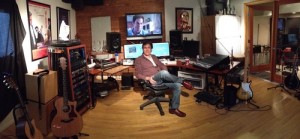 Daniel Licht composed the music for “Dexter” as well as two of the “Silent Hill” video games and films including “Permanent Midnight” and “Stephen King’s Thinner.” He talked to me about the difference between composing for thrillers and comedy and why he hit his guitar with a frying pan.
Daniel Licht composed the music for “Dexter” as well as two of the “Silent Hill” video games and films including “Permanent Midnight” and “Stephen King’s Thinner.” He talked to me about the difference between composing for thrillers and comedy and why he hit his guitar with a frying pan.
Tell me a little bit about where you grew up and your training.
I grew up in Detroit and my training has been a bit mixed. I’ve got quite a varied background. I started playing rock ‘n roll when I was 12 in a garage band, because basically I wasn’t good at football and that was the only way to get girls to like you. And then I got interested in classical music and jazz when I was about 14. Detroit was a great city for jazz. I would sneak out to clubs at the age of 14 or 15. I went to late-night jam sessions in Detroit City. And then I went to Hampshire College and I got into world music and started studying world music. Once I graduated I ended up traveling around the world quite a bit studying music. I went to Java and Bali and I spent some time in Europe traveling around and Japan. And I ended up back in New York and getting a job writing music for commercials, just as a way of making a living.
I came out to visit my friend Christopher Young in California and I saw he was having recording sessions and one side of the room was a Japanese percussion section and then there was a small string section and then there was a choir. It all clicked with my varied background. I realized that this was where I could put it all together.
I had been used to musicians in different categories not liking other types of musicians. If you hang out with the jazz musicians, they didn’t want to have anything to do with the classical musicians because they think they can’t swing. If you hang out with the world music people, they are like, “Oh, you have to do just this if you are true and pure.” I love being able to work in all categories and bring it together.
What did you listen to growing up?
I listened to a lot of music and there was a public station in Detroit called WDET with a late-night DJ who played the most interesting music imaginable. He would go between Herbie Hancock to Sleeping Giant to John Cage, to Sly and the Family Stone and I would go to sleep at night listening to this DJ. It really formed my musical interest. I really came to film music from a love of all music . The film music that I loved the most is the film music that was influenced by music other than film music if you know what I mean. Don’t get me wrong, I love the classic film music and I love the classic John Williams orchestral scores. But my taste is more towards like Ennio Morricone, Gustavo Santaolalla, or Tommy Newman who bring in the world influences.
It seems to me as I look over your resume that you have really spent much of your time on — I’m going to say this in a nice way — kind of creepy stuff, scary, tense moods; is that fair? Is that something you really specialize in?
I definitely have done a lot of that; there’s no question about it. And part of that, that’s a combination of two things. One is that I’ve always been interested in 20th century modern music and like when I was playing jazz, it was avant-garde improvisational jazz. So it’s making scary sounds in a sense and kind of out of the box sounds. So I found that working in that form was the most expressive and the least limited of the kind of music that you could do in the film music category; because I’ve always been interested in pushing the envelope in terms of what kinds of sounds and how you can make them. I’ve always been interested in trying to bend the kind of sounds something can make, playing instruments in different, with different kitchen utensils, even. I used to take my guitar and I would put it on my lap and I would bang it with a frying pan.
So that’s part of what drew me into doing the scary stuff. But it was also because a friend, Christopher Young, he had scored the first two “Hellraisers” and he kind of turned me onto my first gig out here. You get typecast very quickly here once you do one thing and people say, “Oh, that’s what he does.” And that’s not necessarily a bad thing; you want to be known for something because then hopefully people will call you for that thing but I made a conscious effort to get out of doing it because I started doing all horror and thrillers.
I moved towards doing dramatic, I started doing some A&E dramatic films. And then I actually did a film for Disney channel, a Disney TV film called “Don’t Look Under the Bed.” That sort of came out of my scary stuff but it was a Disney film.
And the producer that I work for ended up going on to do comedy; In fact he is one of the producers of “Modern Family.” He kind of trained me to do comedy because I didn’t really have a clue about how comedy worked. Comedy is a completely different than dramatic. Working with drama, you really need to have a whole new tool box. I think that’s one of the things that helped me get the job on the Dexter show. I had experience with comedy and you have to learn how to kind of manipulate the audience but don’t take yourself too seriously at the same time if you know what I mean.
When you are working on a series, is it almost like jazz? Is it improvisational because you have the themes that continue from episode to episode but the cues are different, the characters are different?
Yes, it is a bit like improvising and jazz. Working at “Dexter” for eight years, I was definitely rearranging the same themes. So it’s like when you work on a film or video game, you are putting 50 percent of your effort into writing the themes and designing the sound world. Then the other half is executing it.
And then as time goes on, less of your effort is designing the sound and more is kind of filling in the spaces or building the structure from what you’ve already developed. So there’s a little difference in that you are doing a lot more content for television, if that makes any sense.
How do you balance between keeping it familiar and keeping it fresh?
Well, sometimes people want the comfort of a sound, of a particular cue that they have heard before. It is like a touchstone. But like with Dexter, there’s always new characters and new situations that call for new themes. I also always try and rearrange stuff even the same theme. I’ll do a CD every season of Dexter and I’ve always had a different version of the blood theme on that, for instance.
Tell me more about what’s different about scoring a comedy.
Well, this is going to sound a little hackneyed but it is true. What’s the secret to comedy? It’s about timing, right?
Music is very precise rhythmically and comedy is also very precise rhythmically . So you have to learn to make your music dance with the comedy.





